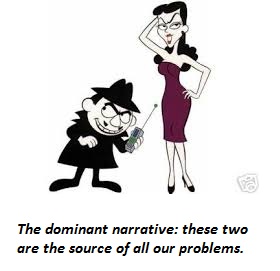oftwominds | The nation's elites are desperate to misdirect us from the financial and power dividethat has enriched and empowered them at the expense of the unprotected many.

There are two competing explanatory narratives battling for mind-share in the U.S.: 1. The nation's social discord is the direct result of Russian social media meddling-- what I call the Boris and Natasha Narrative of evil Russian masterminds controlling a vast conspiracy of social media advertising, fake-news outlets and trolls that have created artificial divides in the body politic, or exacerbated minor cracks into chasms.
2. The nation's social discord is the direct result of soaring wealth/power inequality-- the vast expansion of the wealth and power of the nation's financial elites and their protected class of technocrat enablers and enforcers (the few) at the expense of the unprotected many.

There are two competing explanatory narratives battling for mind-share in the U.S.: 1. The nation's social discord is the direct result of Russian social media meddling-- what I call the Boris and Natasha Narrative of evil Russian masterminds controlling a vast conspiracy of social media advertising, fake-news outlets and trolls that have created artificial divides in the body politic, or exacerbated minor cracks into chasms.
2. The nation's social discord is the direct result of soaring wealth/power inequality-- the vast expansion of the wealth and power of the nation's financial elites and their protected class of technocrat enablers and enforcers (the few) at the expense of the unprotected many.

Core
to this narrative is the view that the elites and technocrats have
engaged in a massive, coordinated official/media propaganda campaign of fake newsaimed at persuading the bottom 95% that their prosperity and financial security are expanding when the reality is they have lost ground they will never be able to recover.
This propaganda campaign includes official (i.e. gamed/distorted)
statistics such as unemployment and inflation, a reliance on the
manipulated stock market to "signal widespread prosperity" and a steady
drumbeat of corporate media coverage promoting the Boris and Natasha Narrative as the primary source of all our troubles.
The reality the elites must mask is that the few (the elites) have benefited at the expense of the many. The
rising tide of financialization, globalization and
neofeudal-neocolonial neoliberalism has not raised all boats; the yachts
have floated higher while the rowboats have either sunk or are leaking
badly.
bloomberg | Forces are aligning to bring some sunlight to the political dark arts
as they’re practiced on social media. Last week, Congress held a
hearing to discuss a bill that would require new disclosures for online
political ads, and a bigger confrontation looms Tuesday when executives
from Facebook Inc., Twitter Inc., and Alphabet Inc.’s Google come to the
hill to discuss Russian meddling in the 2016 presidential election.
Tech
platforms, understandably worried that the salad days of benign neglect
from regulators are numbered, are scrambling to head off new rules by
proposing ways to increase transparency on their own. At the least, it
seems possible that online advertising will soon be subject to some
version of the rules that apply to political ads on TV. But drawing a
line around political activity on social media is tricky no matter who
is wielding the pencil. That’s partially because it’s hard to define
what counts as political activity, and also hard to define what counts
as advertising.


0 comments:
Post a Comment